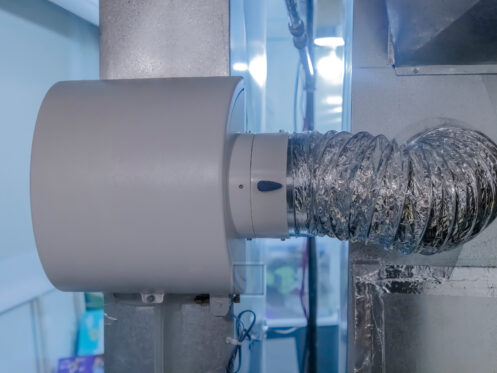The United States Environmental Protection Agency (EPA) cites indoor air quality (IAQ) as having a significant impact on human health. As per the EPA, high concentrations of indoor contaminants can lead to recurring symptoms like itchy, watery eyes, coughing, sneezing, and throat irritation. The EPA also reports that low IAQ can increase the risk of developing chronic respiratory ailments, heart disease, and cancer. Read on to learn all about why IAQ is important and how to improve the quality of air in your Mooresville, NC home.
What Is Indoor Air Quality and How Do You Measure It?
Indoor air quality is a measurement of airborne allergens, chemical contaminants, and dangerous pathogens within a closed environment. It accounts for volatile organic compounds (VOCs) like toluene, benzene, ethylene glycol, and formaldehyde. It also accounts for particulate matter like dirt, dust textile fibers, carpet fibers, pet hairs, pollen, and dander. Concentrations of mold and airborne viruses and bacteria are additionally factored in.
Measuring IAQ is a multi-pronged process. Homeowners and HVAC companies alike use VOC sensors to gauge concentrations of VOCs and other gaseous chemicals. Laser-driven air quality monitors quantify indoor particulates. Depending upon the method used, testing for pathogens can take several days. Cultures are often taken from indoor surfaces to identify the exact organisms present and the magnitude of their populations. However, the easiest way to measure all three of these contributors to poor IAQ is by scheduling a professional indoor air quality assessment.
Measuring Indoor Humidity and Why It’s Important
IAQ assessments quantify all pathogens, contaminants, and allergens. They also measure indoor humidity and compare it to general humidity recommendations. According to the EPA, the ideal range for indoor humidity is between 30% and 50%. However, for most households, a much more feasible target is 40% to 60%. In homes with humidity levels higher than 60%, both dust mites and mold flourish. In homes with humidity less than 40%, IAQ-related symptoms like headaches, nosebleeds, and nasal and sinus congestion often present.
Your HVAC System and Its Impact on Your IAQ
Your first and most important tool for establishing and maintaining a high IAQ is your HVAC system. Central HVAC systems filter air and extract excess humidity before conditioned air is distributed. Standard air filters pick up a fair amount of large-sized particulate matter. These filters sieve out pet hairs, dust, lint, and carpet fibers among other things. Unfortunately, many small-sized particulates pass right through them. Moreover, these components aren’t capable of picking up gaseous chemical contaminants or airborne pathogens like viruses and mold.
Your HVAC System and Humidity Regulation
While HVAC systems offer ongoing humidity regulation, this benefit is limited. Air conditioners, heat pumps, and condensing furnaces extract excess moisture during operation. But, no heater, heat pump, or AC is built to add it. Moreover, moisture removal is indiscriminate. For instance, if you run your condensing furnace for long periods of time, your indoor air will become increasingly dry.
The Many Ways in Which IAQ Can Impact Your Household
Many consumers notice dramatic changes in their IAQ when their comfort declines. For instance, having an overly humid space could lead to musty odors, widespread mold problems, and breathing troubles. However, people often first report their living spaces as feeling muggy, clammy, or downright oppressive. Paying attention to the symptoms that people exhibit and changes in how your home looks or feels can help you pinpoint IAQ issues and correct them.
Respiratory Health
High concentrations of particulate matter, dry air, excessive VOCs, and mold can all leave residents battling a barrage of respiratory symptoms. These include excess mucous, dry and persistent coughs, throat tickles, and even difficulty breathing among other things. If your home has a poor IAQ, you’ll likely find that your respiratory symptoms abate each time you go outside.
Skin, Eyes, and Hair
Airborne irritants sometimes cause skin rashes or minor skin irritation. They can also cause the eyes to become red, weepy, and itchy. When dust mites flourish in overly moist, contaminated homes, eyebrow and eyelash irritation can develop as well. If you leave your IAQ issues unchecked, you might eventually notice adverse changes in the health of your scalp and hair.
Sleep Quality
It isn’t easy to sleep when your sinuses and nose are congested or when dry indoor air causes frequent, nighttime nosebleeds. People with existing, respiratory-related sleep troubles such as sleep apnea often suffer the worst.
Mood Balance
According to the Harvard T.H. Chan School of Public Health, prolonged exposure to certain chemical contaminants can also impact residents’ mental health. People who live in homes with low IAQ often struggle with depression and anxiety. This is all the more true when IAQ challenges negatively impact sleep quality.
How Poor IAQ Affects Your Pets
Having a low IAQ doesn’t just impact human residents. It can also take a toll on the health and well-being of pets. Cats, dogs, and other animals constantly exposed to indoor allergens and contaminants may have sleep troubles and IAQ-related respiratory symptoms, too. Due to poor sleep and feeling generally unwell, some pets also exhibit adverse behavioral changes.
Low IAQ and Your Home and Furnishings
Certain IAQ-related issues such as imbalanced humidity, mildew, and mold can also devalue your property and decrease its marketability. Humidity challenges can lead to warped sub-floors, flooring, baseboards, and other building materials. They can also cause:
- Peeling or blistered paint
- Warped or cracked furnishings
- Mold and mildew furniture damage
- Soft, sagging building elements
Although treating mold on hard, non-porous items is sometimes easy, certain window treatments, sofas, and other cloth or upholstered items frequently need to be thrown away.
IAQ Challenges and the Health of Your HVAC System
Standard HVAC air filters capture and retain large-sized particulates so that this same debris doesn’t coat sensitive components like heat sensors and evaporator coils or create airflow obstructions in ducting or at HVAC air vents. In homes with good IAQ, the micro-fine debris that passes through air filters is considered negligible. However, if your IAQ is poor, these same contaminants can also cause build-ups in the interior of your heating and cooling equipment. Leaving IAQ concerns unchecked can result in:
- Icing
- Overheating
- Inefficient HVAC operation
- Short cycling
- Premature equipment failure
At the very least, unchecked IAQ problems will leave you with higher-than-normal heating and cooling costs.
Different Factors That Constantly Affect Your IAQ
Sadly, your IAQ is always under attack and at risk of plummeting. Countless things that residents do throughout the day add new gaseous chemicals to your living environment. Worse still, your home and all of its materials are also constantly off-gassing VOCs.
Cooking, burning candles, and using plug-in or spray air fresheners are some of the top ways in which residents contaminate their own living spaces. Carpeting, laminates, unsealed particle board and other wood composites, and many paints off-gas VOCs heavily during the first three to five years that follow installation.
Using Integrated HVAC System Accessories to Improve Your IAQ
For ongoing IAQ concerns, homeowners can install integrated HVAC system accessories. These are secondary appliances that we install in HVAC air ducts or attach to them. They include:
- Whole-home humidifiers and dehumidifiers
- Air scrubbers
- Sanitizing UV lights
- Air purifiers
- Media filters
You can schedule an IAQ assessment to learn more about the quality of your home’s indoor air and to determine which integrated HVAC accessory is right for you.
We proudly serve residents of Mooresville, NC. We offer outstanding AC maintenance, furnace, and heat pump installation, maintenance, and repair services. We also provide cutting-edge IAQ improvements. To find out about joining our Comfort Care Club or schedule an appointment, contact Evergreen Heating & Air LLC today.



